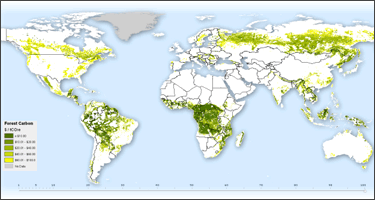The Geography of Forests in Climate Solutions: Introducing the Forest Carbon Index

The Geography of Forests in Climate Solutions:
Introducing the ‘Forest Carbon Index’
RFF Seminar
December 3, 2009

View virtual presentations on the Forest Carbon Index by the project's leaders, Nigel Purvis and Adrian Deveny. |
An Innovative Synthesis of Global Economic, Biological, and Risk Data to Enable Policymakers and Carbon Market Analysts to Dramatically Reduce Emissions from Deforestation
 Deforestation and forest degradation, mostly in the tropics, account for up to 17 percent of global greenhouse gas emissions – more than the entire global transport sector. Using the new Forest Carbon Index, policymakers and businesses can estimate each nation’s potential to contribute to climate solutions through their forest carbon assets.
Deforestation and forest degradation, mostly in the tropics, account for up to 17 percent of global greenhouse gas emissions – more than the entire global transport sector. Using the new Forest Carbon Index, policymakers and businesses can estimate each nation’s potential to contribute to climate solutions through their forest carbon assets.
Developed by RFF and Climate Advisers, the Index provides governments, development agencies, NGOs, and private investors with geospatial data on global, national, and local forest carbon supply, explicitly taking into account country-specific economic, biological, and risk factors (such as governance and ease of doing business). The Index brings together for the first time 27 datasets integrated and mapped across approximately one-and-a-half million locations, creating the clearest picture yet of how forests are likely to feature in climate solutions.
The Index demonstrates that forest conservation can account for 25 percent of global climate solutions through 2020, saving the world approximately $40 billion over this period. To unlock these savings, developed countries and their private sectors will need to invest $20 billion annually in tropical forest conservation, creating new development opportunities as well as risks for local communities.
Presenters, including members of the Forest Carbon Research Team, will discuss a range of short- to long-term strategies by which tropical forests can be instrumental to achieving emissions reduction targets and introduce the online mapping tool with which users can assess the impact of different policy scenarios on the supply of forest carbon assets.
Video and Audio
Event Audio (mp3)
click to stream or right-click to download
Presenters
Ray Kopp, Director, RFF Center for Climate and Electricity Policy
Nigel Purvis, RFF Visiting Scholar and president of Climate Advisers
Adrian Deveny and other members of Forest Carbon Index research team





